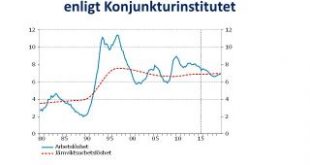Jämviktsarbetslöshet — ett farligt och missvisande mått med kända brister Trots, eller kanske tack vare, de goda utsikterna varnar flera bankekonomer för att ekonomin nu är på väg in i en överhettning. Konjunkturinstitutet (KI) uttrycker oro över att finanspolitiken riskerar bli för expansiv. Myndigheten menar att budgetmålet riskerar att inte hålla samtidigt som det råder brist på strukturella reformer för att minska arbetslösheten på sikt. Trots sjunkande...
Read More »Neoclassical economics is great — if it wasn’t for all the caveats!
Neoclassical economics is great — if it wasn’t for all the caveats! I think that modern neoclassical economics is in fine shape as long as it is understood as the ideological and substantive legitimating doctrine of the political theory of possessive individualism. As long as we have relatively-self-interested liberal individuals who have relatively-strong beliefs that things are theirs, the competitive market in equilibrium is an absolutely wonderful...
Read More »A Simple Framework for Analyzing a Demand-Led Economy
I have been thinking about a simple depiction of a demand-led economy. Mostly it draws on standard Keynesian macro, Kalecki’s work on cycles and growth, and supermultiplier models developed within the surplus approach. The main focus is on the evolution of a demand-led economy through time. The present post simply sketches the basic framework and provides some context. Perhaps in the future certain aspects can be fleshed out. The Basic Framework The level of ‘real’ economic activity – as...
Read More »Simon Wren-Lewis — anti-pluralist mainstream flimflam defender
Simon Wren-Lewis — anti-pluralist mainstream flimflam defender Again and again, Oxford professor Simon Wren-Lewis rides out to defend orthodox macroeconomic theory against attacks from heterodox critics. In his latest attack on heterodox economics and students demanding pluralist economics education he writes: The danger in encouraging plurality is that you make it much easier for politicians to select the advice they like, because there is almost certain...
Read More »Lonely Angel
[embedded content] Advertisements
Read More »Study shows higher minimum wages work
Study shows higher minimum wages work [embedded content] Advertisements
Read More »IPA’s weekly links
Guest post by Jeff Mosenkis of Innovations for Poverty Action. “Economists have now settled down into RCTs as just one tool,” Glennerster told Devex. Among academics, the kind J-PAL works to connect with the world’s policymakers, she said, “the trend toward using RCTs is simply part of this bigger movement in economics to care more about where we can really pin down what is causing what we see.” Any critique I’ve seen of RCTs as a method apply in one way or another to any empirical study...
Read More »Is economics — really — a science?
Is economics — really — a science? As yours truly has reported repeatedly during the last couple of years, economics students all over Europe and the U.S. are increasingly questioning if the kind of economics they are taught — mainstream neoclassical economics — is of any value. Some have even started to question if economics really is a science. My own take on the issue is that economics has lost immensely in terms of status and prestige during the last...
Read More »The minimum wage myth
The minimum wage myth [embedded content] Lo and behold! But of course — when facts and theory don’t agree, it’s the facts that have to be wrong … Just as no physicist would claim that “water runs uphill,” no self-respecting economist would claim that increases in the minimum wage increase employment. Such a claim, if seriously advanced, becomes equivalent to a denial that there is even minimal scientific content in economics, and that, in consequence,...
Read More »Where modern macroeconomics went wrong
Where modern macroeconomics went wrong In the latest issue of Oxford Review of Economic Policy (Volume 34, Issue 1-2, 2018) the editors have invited some well-known contemporary mainstream macroeconomists (including e.g. Simon Wren-Lewis, Randall Wright, Olivier Blanchard, Ricardo Reis, Joseph Stiglitz) to give their views on how to rebuild macroeconomic theory for the future. Some of the contributions are interesting to read. Others — like Wren-Lewis and...
Read More » Heterodox
Heterodox






